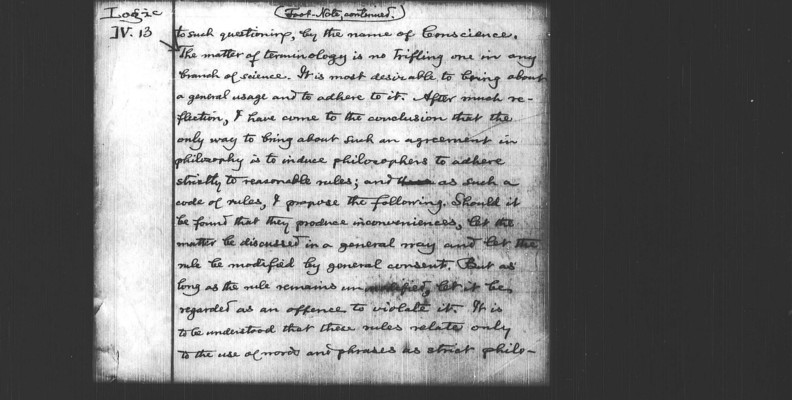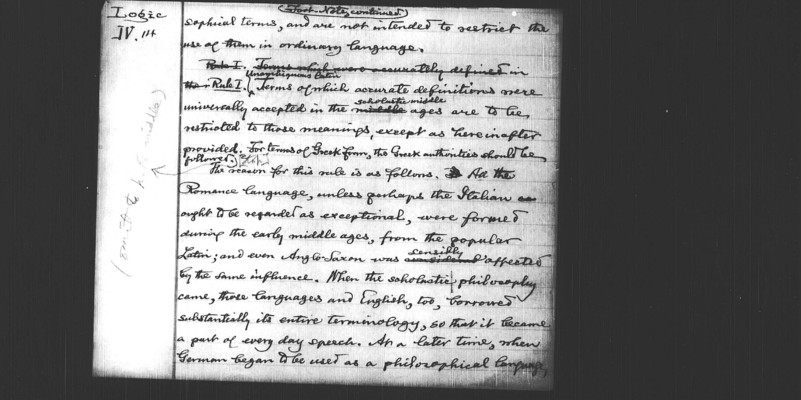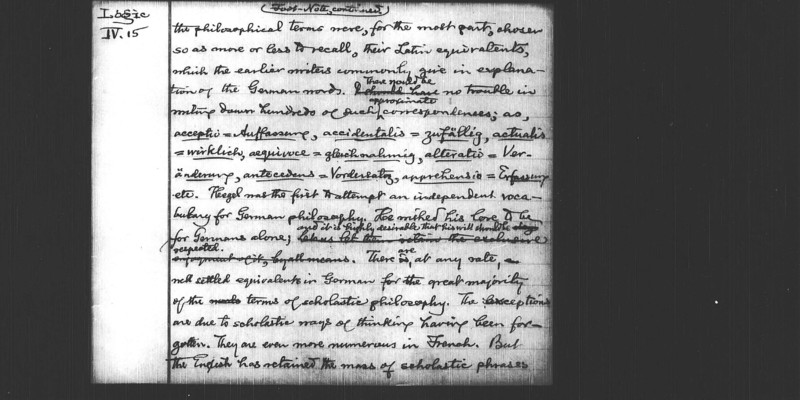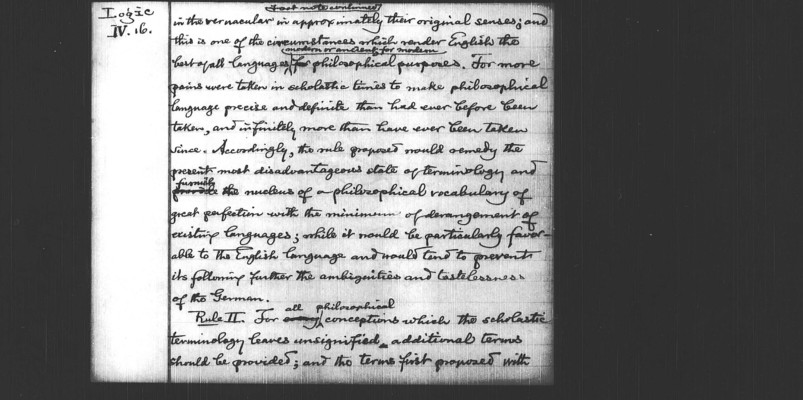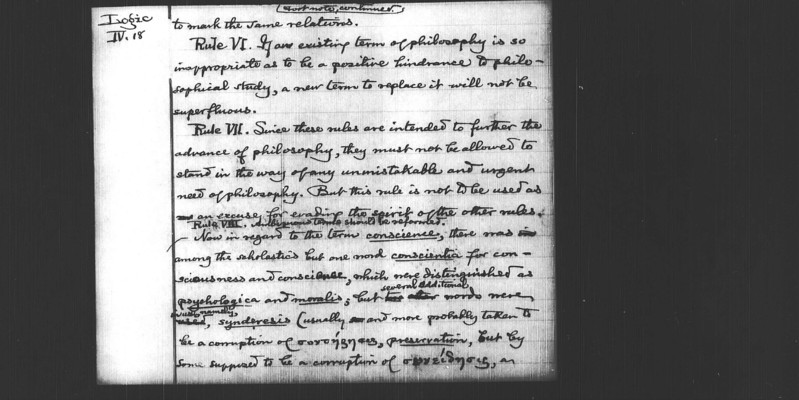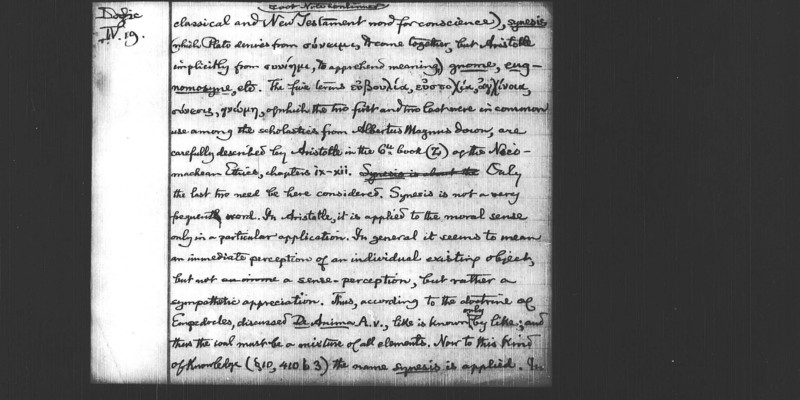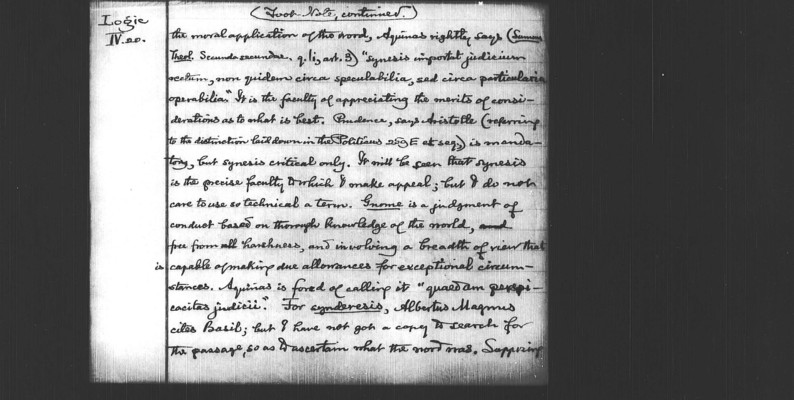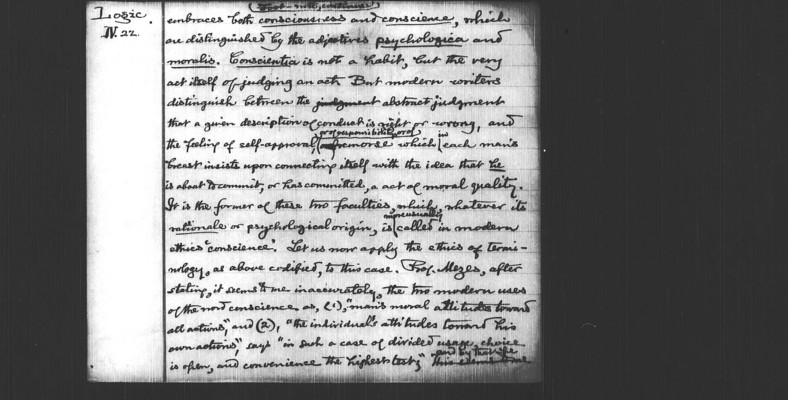Pages That Need Review
MS 434 (1902) - Minute Logic - Chapter IV
2
Logic IV. 13 (footnote continued) to such questionings, by the name of Conscience. The matter of terminology is no trifling one in any branch of science. It is most desireable to bring about a general usage and to adhere to it. After much reflections, I have come to the conclusion that the only way to bring about such as agreement in philosophy is to induce philosophers to adjere strictly to reasonable rules and as such a code of rules I promise the following. Shoud it be found that they produce inconveniences, let the matter be discussed in a general way and let the rule be modified by general consent. but as long as the rule remains unmodified, let it be regarded as an offence to violate it. It is to be understood that these rules realte only to the use of words and phrases as strict philo-
3
Logic IV. 14 sophical terms, and are not intended to restrict the use of them in ordinary language. Rule I. Unambiguous latin terms of which accurate definitions were universally accepted in the scholastic middle ages are to be restricted to those meanings, except as here in after provided. For terms of Greek from, the Greek authorities should be Romance language, unless perhaps the Italian oght to be regarded as exceptional, were formed durign the early middle ages, from the popular Latin and even Anglo-sazon was sensibly affected by the same influence. When the scholatic philosophy came, those languages and Englush, too, borrowed substantially its entire terminology, so that it became a part of every day speech. An a later time when German began to be used as a philosophical language,
4
the philosophical terms were for the most part chosen so as much of less to recall their Latin equivalents which the earlier writers commonly give in explanation of the German words. There would be no trouble in writing down hundred of such approximate correspondences as acceptic= Auffessernce, accidentalis- zufallig, actualis= wriklich, acquivoce= gleichnalimig, aftertio=veranderung, actecedens=vordersatoz, apprehensio=Enfasseng etc. Keegel was the first to atempt an independent vocabulary for German philosophy. He wished his love to be for Germans alone and it is highly desireable that his will should be respected. There are all an fate well settled equivalent in German for the great majroty of the terms of scholastic philosophy. The exceptions are due to scholastic ways of thinking having been forgotten. They are even more numberous in French. But the English has retained the mass of scholastic phrases
5
Logic IV. 16. foot note continued
in the vernacular in approximately their original senses and this is one of the circumstances which render English the best of all languages modern or ancient for modern philosophical purposes. For more pains were taken in scholastic times to make philosophical languages precise and definite than had ever before been taken since. Accordingly the rule proposed would remedy the present most disadvantageous state of terminology and [furnish?] the nucleus of a philosophical vocabulary of great perfection with the minimum of derangement of existing languages while it would be particularly favorable to the English language and would tend to prevent its follwoing futher the ambiguities and tastelessness of the German.
Rule II. For all philosophical conceptions which the scholastic terminology leaves unsignified additional terms should be provided and the terms first proposed with
6
Logic IV. 17 footnote continued adequare definitions should be acknowledged as terms of philosophy with those definitions. But terms substantially superfluous are not to be acknowledged.
Rule III. To use as a term in philosophy in one sens as expression which is a term of philosophy in a conflicting sense should be stigmatized as wrong doings. In order formally to convey a meaning which belongs to a term of philosophy it will be best to use that term.
Rule IV. When a conception of philosoply is generalized a philosophical term signifying it and consisting of a single work may be corresponding generalized a limiting word being provided to mark the old conception. But this proceeding is only justifies in case it is conducive to the advance of philosophy. Rule V. A system of terms marking the relations of a system of old conceptions is not superfluous in case no ther such system exists
7
Logic IV. 18 footnote continued
to mate the same relations.
Rule VI. [Gave?] existing term of philosophy is so inappropriate as to be a positive hinderance to philosophical such a new term to replace it will not be superfluous. Rule VII. Since these rules are intended to further the advance of philosophy they must not be allowed to stand in the way of any unmistakable and urgent need of philosophy. But this rule is not to be used as an axcuse for evading the spirit of the other rules. Rule VIII. Ambiguous terms should be reformed. Now in regard to the term conscience there was among the scholastic but one word conscientia for consciousness and [consciouse?] which were distiguished as psychologica and moralis but several additional words were in use namely synderesis (usually and more probably taken to be a corruption of [?] preservation but by some supposed to be a corruption of [?] an
8
Logic IV. 19. foot note continued
classical and new Testament word for conscience) synesis (which Plato derives from [?] together but Aristotle implicitly from [?] to apprehend meaning) gnome, eugnomosyne, etc. The five terms [?][?][?][?][?] of which the two first and two last were in common use among the scholastics from Albertus magnus [?] are carefully descibed by Aristotle in the 6th book of the Nicomachean Ethico chapters ix-xii. Only the last two need be considered here. Synesis is not a very frequent work. In Aristotle it is applied to the moral sense only in a particular applicaton. In general it seems to mean an immediate perception of an individual existing object but not a sense-perception but rather a synopathetic appreciation. Thus according to the doctrine of [Empedocles?] discussed [DeAnima A.V.?] like is know only by like and thus the soul must be a mist of all elements. Now to this kind of knowledge (10, 410 b 3) the name synesis is applied. In
9
Logic IV. 20. (Foot Note continued) the moral application of the word, Aquinas rightly says [Summon Theal?]. [Secunda secundae?]. q. li, ab.3 "synesis importat judiciusn sectum nor guidem circa speculabilia sed circa particularia operabilia." It is the faculty of appreciating the merits of considerations as to what is best. Prudence says Aristitle 9referring to the distinction lad dwon in the Politics 25gE et seq.) is mandatory but synesis critical only. It will be seen that synesis is the preceise faculty to which I make appeal but I do not care to use so technical a term. Gnome is a judgement of conduct based on thorough knowledge of the world and free from harshness and involving a breadth of view that is capable of making due allowances for exceptional circumstances. Aquinas is forced of calling it "quaed am perepicacitas judicii." For synderesis Alberus Magmus cites Basil but I have not got a copy to search for the passage so as to ascertain what the word was. Supposing
10
Logic IV. 21 Foot note continued
that is was [?] preservation from [?] to guard the fundamental idea perhaps is to wrap up while with a short vowel [?] VTEP means to remove the surface the reference must be to the embers of conscience left in [Adorn?] after the fall and preserved alike in the breasts of all. It is oftencalled the judicatorium, in quo scrito est les naturalis. It appears to have been regards as an impulse toward the good and it is futher said to be the "morsus conscientine." Aquinas defines it as "lex intellctus nostri inquantum est habitus continens praecepta legis naturalix quae suns prima operum humanorum." (Summa theol. sec cec q xciv. art1.) Although Descartes was almost the last writer to use the word yet it is familiar enough to all students of ethics. There is nothing in the great doctors of scholasticism to warrant the statement and that it is merely the natural knowledge of the general laws and is correlated to the particular act. It is that habit of the soul from which word judgements spring. Conscientia among the scholastics
11
Logic IV. 22 foot note continued embraces both consciousness and conscience which are distinguished by the adjective psychologica and moralis. Conscientia is not a habit but the very act itself of judgeing an act. But modern writes distinguish between the abstract judgement that a given description of conduct is right or wrong and the feeling of self approval or of responsibilities or of remorse which in each man's breast insists upon connecting itself with the idea that he is about to commit or has committed a act of moral quality. It is the former of these two faculties which whater its national or psychological origin is more usually called in modern ethics 'conscience.' Let us now apply the ethics of terminology as above codified to this case. Roy Mezes, after stating it seem to me iaccuralty the two modern uses of the work conscience as (1) man's moral attituded toward all actions and (2) the individuals attititudes toward his own actions , says in such a case of divided usage choice and by that he is often and convenience the highest test
